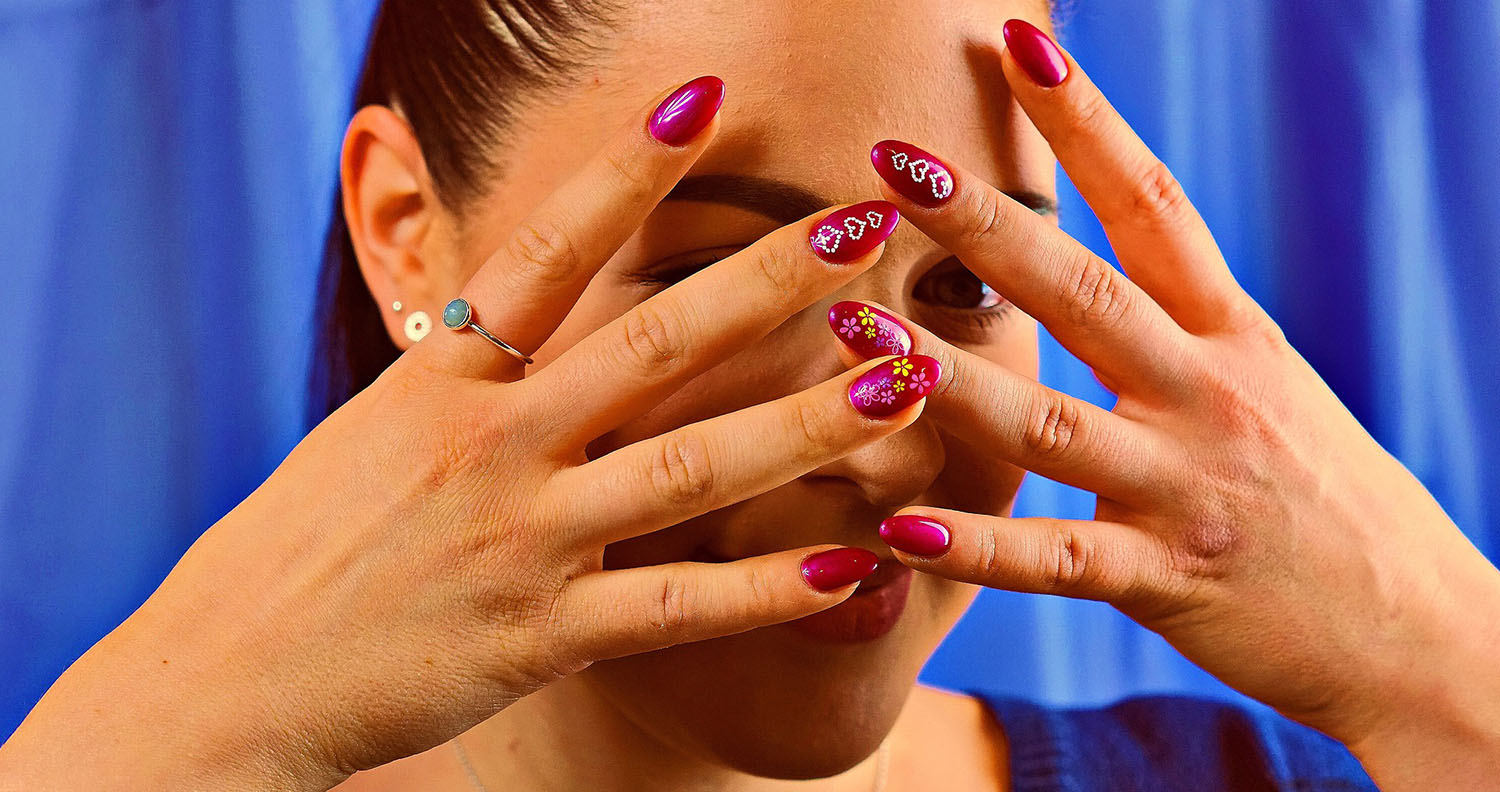How to use hypnosis for nail biting.
What do ex-British prime minster Gordon Brown, Jackie Onassis and Britney Spears all have in common? Answer: they were/are all nail biters.
Many people bite their nails at some point, especially when they are younger. It’s a type of bodyfocused repetitive behaviour pattern called onychophagia. Not all nail biting is the same. It can range from an occasional unfocused behaviour to a deeply ingrained self-mutilation.
Many people who begin biting their nails as children eventually outgrow the habit. For others, it becomes a lifelong habit that can be extremely difficult to stop.
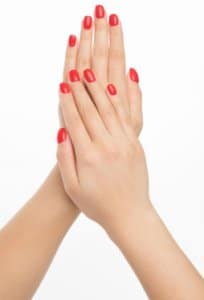 What will I learn in this blog?
What will I learn in this blog?
• That nail biting often has its origins in childhood
• Some people find it easier to stop than others
• Looking at the cause of nail biting is often useful
• How hypnosis could help you to kick the habit
Why did I start to bite my nails?
According to doctors at Cedars Sanai, there are a variety of reasons why this strangely destructive behaviour might take place.
When we are nervous or anxious, it’s not uncommon to engage in repetitive behaviours, however, it can lead to all kinds of unexpected problems.
For example, nail biters are more prone to develop colds and flu. After all, your hands are teeming with bacteria, especially beneath the nails. If your fingers are always in your mouth, the bacteria they touch land there too.
“Nail biting generally begins in childhood and adolescence,” says Dr. Maria Scremin, a primary care provider at Cedars-Sinai.
If you’re a nail-biting adult, chances are good that you picked up the habit when you were young. But there are good reasons to break the habit.
About half of all children and teens bite their nails. Many don’t grow out of it, either. If you’re an adult who bites your nails, you may have done it when you were younger and just never stopped.
It could be your parents’ fault: Scientists aren’t sure if nail biting is genetic, but children whose parents bite their nails are more likely to bite their nails, too. Studies show this happens even if the parents stop doing it before their child is born.
Sometimes, nail biting can be a sign of emotional or mental stress. It tends to show up in people who are nervous, anxious or feeling down. It’s a way to cope with these feelings.
You may also find yourself doing it when you’re bored, hungry or feeling insecure. Most nail biting is automatic — you do it without thinking.
Why do I do it?
While there are no clear-cut reasons for nail biting, a variety of factors can increase the likelihood of you chewing on your fingernails.
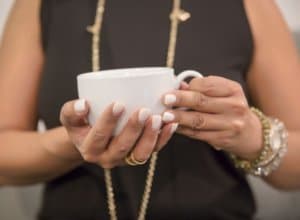 Genetics: Children whose parents bite their nails are more likely to follow suit.
Genetics: Children whose parents bite their nails are more likely to follow suit.
Anxiety: Nail biting can be a sign of anxiety or stress. The repetitive behaviour seems to help some people cope with
challenging emotions.
Boredom: Behaviours such as nail biting and hair twirling are more common when you’re bored, hungry, or need to keep your hands busy.
For most people, nail biting is automatic: You do it without thinking about it. While it can occur without any underlying psychiatric conditions, it’s also associated with attention deficit hyperactivity disorder (ADHD), separation anxiety, tic disorder, and other mental health problems. In rare cases, nail biting may be a side effect of medication.
Most of the time though, it’s just associated with stress or boredom and that’s good news; because it’s mostly habitual in nature, psychotherapy and hypnotherapy offer you a way out of having damaged nails and a path to feeling better about yourself.
Why should I stop?
Self-Image. Many people feel bad about how they look, and often hide their damaged nails from view to avowing the gaze of others.
Confidence. It’s tough to look strong and confident in a meeting if you are biting your nails. You may also avoid shaking hands with someone if you’re embarrassed about how your hands look. OK, noone shakes hands anymore, but you get the point.
Cosmetic. It can make your nails grow strangely. If you damage the tissue around your nails, they may stop growing the way they should. This gives you abnormal-looking nails.
Smile. It can spoil your smile. You can chip, crack, or break your teeth when you bite your nails. Overtime, nail biting can even cause jaw problems.
Health. It can make you sick. Hands are a hotbed for germs, and nails are their perfect hideout. When you’re putting your fingers in your mouth multiple times a day, it increases your chances of getting sick. Plus, the skin damage you can cause when you bite your nails creates an easy way for germs to get in.
How do we take back control?
According to Nicole Pajer at Huffpost, there are lots of things you can do to give yourself the fingernails you deserve.
1. Identify your triggers
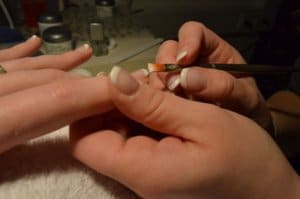 Before attempting to curb your nail-biting habit, it’s helpful to take a moment to identify what is causing you to bite your nails in the first place.
Before attempting to curb your nail-biting habit, it’s helpful to take a moment to identify what is causing you to bite your nails in the first place.
The key to stopping is to figure out what your trigger is and take action against it.
“You can try all the traditional things, like wearing gloves, chewing gum or using acrylic nails all you want to try to stop, but until you get to the root of your behaviour, you’ll never be able to kick the habit once and for all,” said Kathryn Smerling, a New York-based therapist.
Smerling suggested keeping a journal or making mental notes of what is happening when you bite your nails in order to get a better understanding of what sparks your bad habit.
“Is it during meetings at work because you’re stressed? Are you at home watching TV and trying to pass the time? Figure out what it is, whether certain events, specific people or emotional states, and then work to change your reaction to those stressful scenarios,” she said.
2. Enlist the help of friends
Don’t be afraid to ask for help. Enlist the assistance of those you love to help get you through. Research shows that teaming up with a friend to reach a goal can increase your chances of succeeding by 95 percent.
Ask friends and family to let you know (kindly) if they see you start to bite your nails, or encourage them to cheer you on. Better yet, find a friend who also wants to stop biting their own nails and make a pledge to help each other.
3. Educate yourself
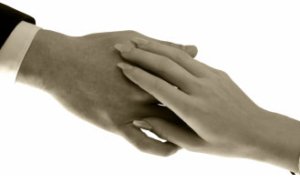 Learn yourself about what could be lurking underneath your nails and you’ll never want to bite them again.
Learn yourself about what could be lurking underneath your nails and you’ll never want to bite them again.
“People who bite their nails don’t usually clean their hands prior to putting them in their mouths, thus exposing themselves to a number of pathogens that can lead to illness, such as the flu,” said dermatologist Hal Weitzbuch..
Weitzbuch added that many of the common germs found on our bodies are commonly found under the nails, which includes staph bacteria (responsible for some infections) and strep species. Fungus is also commonly found under the nails, which can lead to onychomycosis, a nail fungus that turns nails yellow, brown or black, Weitzbuch said.
“It is very common for patients with warts on their hands to get the warts on their lips or in their mouth, and sometimes very unfortunately even deeper in their larynx,” he continued. So in general, it’s best to keep your nails away from your mouth.
4. Think of your teeth
You floss every night and brush your teeth at least once a day, but biting your nails could be wreaking havoc on your teeth.
When you bite down on your nails, you subject your pearly whites to all sorts of potential damage. Studies have found that the force of biting nails can be transferred to the root of teeth, causing a variety of tooth and gum injuries as well as conditions like infection and tooth rot.
5. Get regular manicures
People who pay for manicures tend to bite their nails less. Easy!
6. Use your phone to your advantage
 Enlist the help of apps like Streaks, which can help you tally how many days in a row you avoid biting your nails. The goal of the program is to rack up consecutive days of achievement so that you will work harder to maintain the momentum.
Enlist the help of apps like Streaks, which can help you tally how many days in a row you avoid biting your nails. The goal of the program is to rack up consecutive days of achievement so that you will work harder to maintain the momentum.
If you want to get even fancier, you can try a product like HabitAware. The bracelet looks like a fitness tracker and uses motion sensors to detect its wearer’s specific behaviour after a one-time training with a companion mobile app. When the device senses your hand doing your unwanted gesture, it vibrates to make you aware of what you are doing, giving you an opportunity to stop.
7. Visualise how you want your nails to look
If you want to stop biting your nails, keeping an eye on the perfect fingertips may help ease the process along.
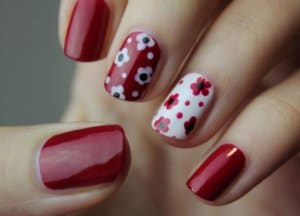 “Put photos of beautiful hands and nails up on your bathroom mirror, in your car, or even as your phone’s wallpaper,” said Julie Kandalec, aka Julie Off Duty, a celebrity nail stylist who has worked with clients like Viola Davis, Emma Roberts and Hailee Steinfeld. “It acts as a constant visual reminder of what your nails and hands will look like if you stop.”
“Put photos of beautiful hands and nails up on your bathroom mirror, in your car, or even as your phone’s wallpaper,” said Julie Kandalec, aka Julie Off Duty, a celebrity nail stylist who has worked with clients like Viola Davis, Emma Roberts and Hailee Steinfeld. “It acts as a constant visual reminder of what your nails and hands will look like if you stop.”
8. Reward your progress
When it comes to achieving a goal like quitting the nail-biting game, it’s important to celebrate your victories along the way.
How does hypnotherapy help you towards beautiful nails?
Hypnotherapy works from 2 different directions, firstly to look and see what actually causes you to bite your fingernails and then to give you the tools you need to be able to fight that urge by increasing your feelings of calmness, physical relaxation and control.
Calmness is the antidote to anxiety. When your mind is calm, you see things in their true perspective, and with their correct levels of meaning. Because your outlook is more rational, thinking and optimistic, it prevents the negative thoughts from getting a hold and taking it out on your nails.
Now, there is a side-effect of being calm, and it’s that your body relaxes. No longer at DEFCON 1 and under attack, your muscles relax, your heart rate and blood pressure are adequate and you feel at ease with yourself.
Of course, there is natural effect from feeling and being calm and relaxed, and that’s confidence. The too main ingredients of confidence are mental calmness and physical relaxation, when you think about times in your life that you’ve been most confident, they have always been when you felt calm and relaxed.
Confidence naturally leads to feeling and being more competent. So you can see things more clearly with the correct level of meaning with true importance. And because your mind is calm, your body is relaxed, you feel confident, you see things in their perspective. The quality of your natural sleep also becomes progressively better and better, so that you wake up in the morning feeling and being calm, relaxed, in charge, in control, happy and at ease.
In the sessions, you are taught to relax to a very deep level and you can also have a specially-recorded self-hypnosis session. To use at home, then you can gradually replace the old feelings with the new ones, until they just feel right.
It’s important to find a therapist that respects your confidentiality, so that you feel comfortable telling them all about your issues.
Remember, your exterior world is a reflection of who you are on the inside. To change your outer world, you have to change your inner world. That’s where hypnosis really comes in.
To find out more about hypnosis and how it works, have a look here at our ‘what is hypnosis’ page.
CASE STUDY
Cynthia Newman had bitten her fingernails ever since she was a child. Could hypnosis cure her?
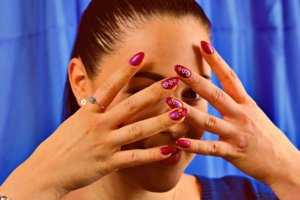 Yesterday was my last consultation at the Hypnosis Clinic. I am totally amazed that just after four consultations I have kicked my nail biting habit, that is a habit of 40 years gone in 4 hourly sessions!
Yesterday was my last consultation at the Hypnosis Clinic. I am totally amazed that just after four consultations I have kicked my nail biting habit, that is a habit of 40 years gone in 4 hourly sessions!
I believe that Jonathan at the Hypnosis Clinic can help anybody with any habit, addiction, problem or condition. I have had hypnotherapy in London and Jonathan’s skills are the best I have even encountered.
After the first session I stopped biting my nails and I became aware of when, how and why I was doing this. My mind started working with me and not against me and it has been amazing learning experience.
Having attended the Hypnosis Clinic has not only helped me with nail biting but also I now manage stress much better. I am calmer, happier and much more confident.
In that respect I would recommend it to anybody as we can all do with less stress and more confidence and general well being.
I found the whole experience relaxing and professional. After every session I felt healthier, calmer and ready to face all the challenges of life.
What did I learn here?
That nail biting can be challenging; it often has roots into our childhood, however, even serious addicts can be cured.
If you’d like to find out more about how hypnosis can help you to be free of nail biting, have a look at our website. We offer a free initial consultation, either by a Telehealth video link or at our clinic right in the heart of London’s Regent Street.

